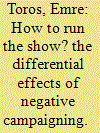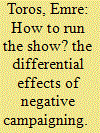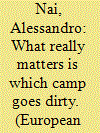| Srl | Item |
| 1 |
ID:
152451


|
|
|
|
|
| Summary/Abstract |
Although the academic literature on negative campaigning is growing, more research is needed to contribute to the theoretical and empirical knowledge on the phenomenon. Accordingly, this article examines the impact of negative political messages on political trust in Turkey. The findings indicate that although exposure to negativity alters the trust level of the citizens, this impact is not uniform and dependent on party identifications.
|
|
|
|
|
|
|
|
|
|
|
|
|
|
|
|
| 2 |
ID:
152452


|
|
|
|
|
| Summary/Abstract |
Although the academic literature on negative campaigning is growing, more research is needed to contribute to the theoretical and empirical knowledge on the phenomenon. Accordingly, this article examines the impact of negative political messages on political trust in Turkey. The findings indicate that although exposure to negativity alters the trust level of the citizens, this impact is not uniform and dependent on party identifications.
|
|
|
|
|
|
|
|
|
|
|
|
|
|
|
|
| 3 |
ID:
142293


|
|
|
|
|
| Summary/Abstract |
The academic literature on negative campaigning is growing. As an attempt to contribute to the theoretical and empirical knowledge on the phenomena, this study focuses on the Turkish elections and tries to provide answers to the following research questions: What is the level of negativity in Turkish electoral campaigns and which factors are salient for going negative for Turkish political parties? Findings display the fact that negativity is noticeably high in Turkey, and incumbency, ideology and time focus of messages are salient factors for negativity.
|
|
|
|
|
|
|
|
|
|
|
|
|
|
|
|
| 4 |
ID:
149342


|
|
|
|
|
| Summary/Abstract |
What drives candidates to “go negative” and against which opponents? Using a unique dataset consisting of all inter-candidate tweets by the 17 Republican presidential candidates in the 2016 primaries, we assess predictors of negative affect online. Twitter is a free platform, and candidates therefore face no resource limitations when using it; this makes Twitter a wellspring of information about campaign messaging, given a level playing-field. Moreover, Twitter’s 140-character limit acts as a liberating constraint, leading candidates to issue sound bites ready for potential distribution not only online, but also through conventional media, as tweets become news. We find tweet negativity and overall rate of tweeting increases as the campaign season progresses. Unsurprisingly, the front-runner and eventual nominee, Donald Trump, sends and receives the most negative tweets and is more likely than his opponents to strike out against even those opponents who are polling poorly. However, candidates overwhelmingly “punch upwards” against those ahead of them in the polls, and this pattern goes beyond attacks against those near the top. Sixty of 136 dyads are characterized by lopsided negativity in one direction and only one of these 60 involves a clearly higher status candidate on the offensive.
|
|
|
|
|
|
|
|
|
|
|
|
|
|
|
|
| 5 |
ID:
120131


|
|
|
|
|
| Publication |
2013.
|
| Summary/Abstract |
Using individual data on Swiss federal ballots (VOX data) and an original dataset on the evolution and content of political campaigns, this article elucidates how negative campaigning influences individual turnout during Swiss federal ballots. It hypothesises that the effect of negativism on turnout depends on 'which camp goes dirty' and, specifically, on the direction of the political campaign ('status quo' versus 'policy change' campaigns). A series of multilevel models provide strong support for the hypotheses, by showing that high negativism in 'status quo campaigns' decreases individual turnout, whereas high negativism for 'policy change campaigns' increases it. It is argued here that this could depend on the emotional responses triggered by negativism in political campaigns.
|
|
|
|
|
|
|
|
|
|
|
|
|
|
|
|